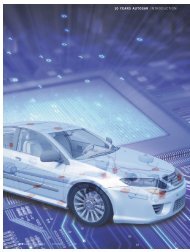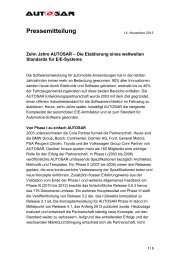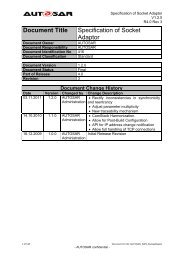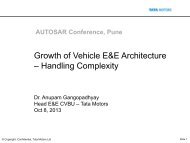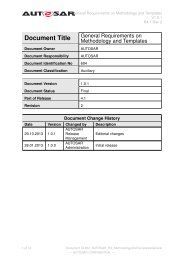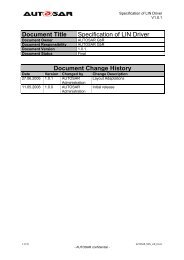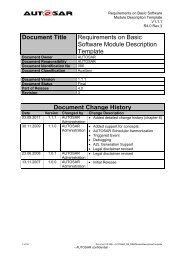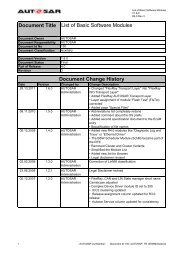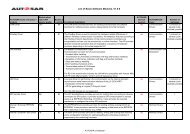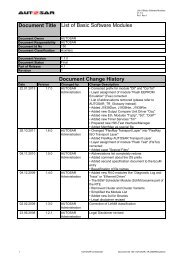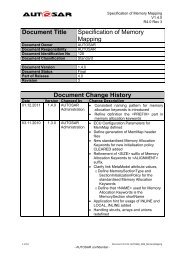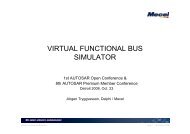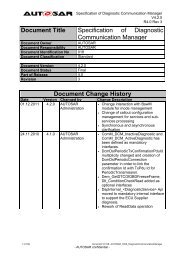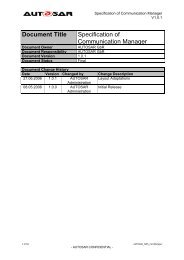(SPI) Handler/Driver - autosar
(SPI) Handler/Driver - autosar
(SPI) Handler/Driver - autosar
You also want an ePaper? Increase the reach of your titles
YUMPU automatically turns print PDFs into web optimized ePapers that Google loves.
Requirements on Serial Peripheral Interface<br />
(<strong>SPI</strong>) <strong>Handler</strong>/<strong>Driver</strong><br />
V2.0.5<br />
R3.2 Rev 1<br />
Document Title Requirements on Serial<br />
Peripheral Interface (<strong>SPI</strong>)<br />
<strong>Handler</strong>/<strong>Driver</strong><br />
Document Owner AUTOSAR<br />
Document Responsibility AUTOSAR<br />
Document Identification No 077<br />
Document Classification Auxiliary<br />
Document Version 2.0.5<br />
Document Status Final<br />
Part of Release 3.2<br />
Revision 1<br />
Document Change History<br />
Date Version Changed by Change Description<br />
23.03.2011 2.0.5 AUTOSAR<br />
Administration<br />
Legal disclaimer revised<br />
23.06.2008 2.0.4 AUTOSAR<br />
Administration<br />
Legal disclaimer revised<br />
31.10.2007 2.0.3 AUTOSAR � Document meta information extended<br />
Administration � Small layout adaptations made<br />
24.01.2007 2.0.2 AUTOSAR � “Advice for users” revised<br />
Administration � “Revision Information” added<br />
28.11.2006 2.0.1 AUTOSAR<br />
Administration<br />
Legal disclaimer revised<br />
30.03.2006 2.0.0 AUTOSAR Release as a separate document. The SRS<br />
Administration SPAL V1.0.0 has been split into 12<br />
independent documents for Release 2.0.<br />
� Change of the document scope (§1), the<br />
functional overview (§5.1.1 / §5.2.1 / §5.3.1)<br />
� Add of [BSW13400] Scalable functional<br />
perimeter, [BSW13401] Functional<br />
perimeter statically configurable<br />
� Change of following requirements<br />
BSW12151, BSW12152, BSW12153,<br />
BSW12154 and BSW12197], [BSW13400],<br />
[BSW13401]<br />
� Approvement of [BSW12151], [BSW13400],<br />
[BSW13401], BSW12152, BSW12153 and<br />
BSW12154<br />
11.07.2005 1.0.0 AUTOSAR Initial release as a part of the SRS SPAL<br />
Administration V1.0.0<br />
1 of 28 Document ID 077: AUTOSAR_SRS_<strong>SPI</strong>_<strong>Handler</strong><strong>Driver</strong><br />
- AUTOSAR confidential -
Disclaimer<br />
Requirements on Serial Peripheral Interface<br />
(<strong>SPI</strong>) <strong>Handler</strong>/<strong>Driver</strong><br />
V2.0.5<br />
R3.2 Rev 1<br />
This specification and the material contained in it, as released by AUTOSAR is for<br />
the purpose of information only. AUTOSAR and the companies that have contributed<br />
to it shall not be liable for any use of the specification.<br />
The material contained in this specification is protected by copyright and other types<br />
of Intellectual Property Rights. The commercial exploitation of the material contained<br />
in this specification requires a license to such Intellectual Property Rights.<br />
This specification may be utilized or reproduced without any modification, in any form<br />
or by any means, for informational purposes only.<br />
For any other purpose, no part of the specification may be utilized or reproduced, in<br />
any form or by any means, without permission in writing from the publisher.<br />
The AUTOSAR specifications have been developed for automotive applications only.<br />
They have neither been developed, nor tested for non-automotive applications.<br />
The word AUTOSAR and the AUTOSAR logo are registered trademarks.<br />
Advice for users<br />
AUTOSAR Specification Documents may contain exemplary items (exemplary<br />
reference models, "use cases", and/or references to exemplary technical solutions,<br />
devices, processes or software).<br />
Any such exemplary items are contained in the Specification Documents for<br />
illustration purposes only, and they themselves are not part of the AUTOSAR<br />
Standard. Neither their presence in such Specification Documents, nor any later<br />
documentation of AUTOSAR conformance of products actually implementing such<br />
exemplary items, imply that intellectual property rights covering such exemplary<br />
items are licensed under the same rules as applicable to the AUTOSAR Standard.<br />
2 of 28 Document ID 077: AUTOSAR_SRS_<strong>SPI</strong>_<strong>Handler</strong><strong>Driver</strong><br />
- AUTOSAR confidential -
Table of Content<br />
Requirements on Serial Peripheral Interface<br />
(<strong>SPI</strong>) <strong>Handler</strong>/<strong>Driver</strong><br />
V2.0.5<br />
R3.2 Rev 1<br />
1 Scope of this document....................................................................................... 5<br />
2 How to read this document.................................................................................. 6<br />
2.1 Conventions used......................................................................................... 6<br />
2.2 Requirements structure ................................................................................ 7<br />
3 Acronyms, abbreviations and expressions .......................................................... 8<br />
4 Requirement Specification................................................................................. 10<br />
4.1 <strong>SPI</strong> <strong>Handler</strong>/<strong>Driver</strong>, common requirements................................................ 10<br />
4.1.1 Functional Overview............................................................................ 10<br />
4.1.2 Functional Requirements .................................................................... 11<br />
4.1.2.1 General ........................................................................................ 11<br />
4.1.2.1.1 [BSW12093] <strong>SPI</strong> Channel support............................................ 11<br />
4.1.2.1.2 [BSW12094] Chip select........................................................... 11<br />
4.1.2.1.3 [BSW12256] Support of all controller peripherals ..................... 11<br />
4.1.2.1.4 [BSW12257] Support of chained HW devices........................... 12<br />
4.1.2.1.5 [BSW13400] Scalable functionality ........................................... 12<br />
4.1.2.2 Configuration................................................................................ 12<br />
4.1.2.2.1 [BSW12025] Configuration of <strong>SPI</strong> general SW and HW<br />
properties 12<br />
4.1.2.2.2 [BSW12179] <strong>SPI</strong> Channel linkage ............................................ 13<br />
4.1.2.2.3 [BSW12026] Assignment of <strong>SPI</strong> Channel to <strong>SPI</strong> HW Unit........ 14<br />
4.1.2.2.4 [BSW12197] Definition of data width ........................................ 14<br />
4.1.2.2.5 [BSW13401] Statically configurable functionalities ................... 14<br />
4.1.2.3 Normal Operation......................................................................... 15<br />
4.1.2.3.1 [BSW12258] Data shall be accessible from each device<br />
individually15<br />
4.1.2.3.2 [BSW12259] Support of different timing and HW parameters... 15<br />
4.1.2.3.3 [BSW12260] Support of different priorities of sequences.......... 15<br />
4.1.2.3.4 [BSW12180] Handling of single <strong>SPI</strong> channels .......................... 16<br />
4.1.2.3.5 [BSW12181] Handling of linked <strong>SPI</strong> channels .......................... 16<br />
4.1.2.3.6 [BSW12032] Chip select mode – normal mode ........................ 16<br />
4.1.2.3.7 [BSW12033] Chip select mode – hold mode ............................ 17<br />
4.1.2.3.8 [BSW12198] Transfer one short data sequence with variable<br />
data 18<br />
4.1.2.3.9 [BSW12253] Transfer one short data sequence with constant<br />
data 18<br />
4.1.2.3.10 [BSW12199] Transfer data to multiple devices in one Sequence<br />
18<br />
4.1.2.3.11 [BSW12200] Read large data sequences from one slave device<br />
using dummy send data ............................................................................. 19<br />
4.1.2.3.12 [BSW12261] Read large data sequences from one slave device<br />
using variable send data ............................................................................ 19<br />
3 of 28 Document ID 077: AUTOSAR_SRS_<strong>SPI</strong>_<strong>Handler</strong><strong>Driver</strong><br />
- AUTOSAR confidential -
Requirements on Serial Peripheral Interface<br />
(<strong>SPI</strong>) <strong>Handler</strong>/<strong>Driver</strong><br />
V2.0.5<br />
R3.2 Rev 1<br />
4.1.2.3.13 [BSW12201] Read large data sequences from multiple slave<br />
devices using dummy send data ................................................................ 19<br />
4.1.2.3.14 [BSW12262] Read large data sequences from multiple slave<br />
devices using variable send data ............................................................... 20<br />
4.1.2.3.15 [BSW12202] Support of variable data length .......................... 20<br />
4.1.2.4 Fault Operation ............................................................................ 20<br />
4.2 Asynchronous <strong>SPI</strong> functionality.................................................................. 21<br />
4.2.1 Functional Overview............................................................................ 21<br />
4.2.2 Functional Requirements .................................................................... 21<br />
4.2.2.1 Configuration................................................................................ 21<br />
4.2.2.1.1 [BSW12024] Configuration of <strong>SPI</strong> HW Unit .............................. 21<br />
4.2.2.1.2 [BSW12150] Configuration of <strong>SPI</strong> asynchronous SW and HW<br />
properties 21<br />
4.2.2.2 Normal Operation......................................................................... 22<br />
4.2.2.2.1 [BSW12108] Callback notification............................................. 22<br />
4.2.2.2.2 [BSW12099] Asynchronous Read Functionality ....................... 22<br />
4.2.2.2.3 [BSW12101] Asynchronous Write Functionality........................ 23<br />
4.2.2.2.4 [BSW12103] Asynchronous Read-Write Functionality.............. 23<br />
4.2.2.2.5 [BSW12037] Job Management Strategy – Priority controlled ... 24<br />
4.2.2.2.6 [BSW12104] <strong>SPI</strong> status functionality ........................................ 24<br />
4.2.2.2.7 [BSW12170] Concurrent Channel access................................. 24<br />
4.3 Synchronous <strong>SPI</strong> functionality.................................................................... 25<br />
4.3.1 Functional Overview............................................................................ 25<br />
4.3.2 Functional Requirements .................................................................... 25<br />
4.3.2.1 Normal Operation......................................................................... 25<br />
4.3.2.1.1 [BSW12152] Synchronous Read Function................................ 25<br />
4.3.2.1.2 [BSW12153] Synchronous Write Function................................ 26<br />
4.3.2.1.3 [BSW12154] Synchronous Write-Read Function ...................... 26<br />
4.3.2.1.4 [BSW12151] Job Management Strategy – Order of requests... 27<br />
5 Related Documentation..................................................................................... 28<br />
5.1 Deliverables of AUTOSAR ......................................................................... 28<br />
4 of 28 Document ID 077: AUTOSAR_SRS_<strong>SPI</strong>_<strong>Handler</strong><strong>Driver</strong><br />
- AUTOSAR confidential -
1 Scope of this document<br />
Requirements on Serial Peripheral Interface<br />
(<strong>SPI</strong>) <strong>Handler</strong>/<strong>Driver</strong><br />
V2.0.5<br />
R3.2 Rev 1<br />
This document specifies requirements on the monolithic <strong>SPI</strong> <strong>Handler</strong>/<strong>Driver</strong> module<br />
including:<br />
� Multiple <strong>SPI</strong> busses handling<br />
� Synchronous <strong>SPI</strong> transmission<br />
� Asynchronous <strong>SPI</strong> transmission<br />
Constraints<br />
First scope for specification of requirements on basic software module is systems<br />
which are not safety relevant. For this reason safety requirements are assigned to<br />
medium priority.<br />
5 of 28 Document ID 077: AUTOSAR_SRS_<strong>SPI</strong>_<strong>Handler</strong><strong>Driver</strong><br />
- AUTOSAR confidential -
2 How to read this document<br />
Requirements on Serial Peripheral Interface<br />
(<strong>SPI</strong>) <strong>Handler</strong>/<strong>Driver</strong><br />
V2.0.5<br />
R3.2 Rev 1<br />
Each requirement has its unique identifier starting with the prefix “BSW” (for “Basic<br />
Software”). For any review annotations, remarks or questions, please refer to this<br />
unique ID rather than chapter or page numbers!<br />
2.1 Conventions used<br />
In requirements, the following specific semantics are used (taken from Request for<br />
Comment RFC 2119 from the Internet Engineering Task Force IETF)<br />
The key words "MUST", "MUST NOT", "REQUIRED", "SHALL", "SHALL NOT",<br />
"SHOULD", "SHOULD NOT", "RECOMMENDED", "MAY", and "OPTIONAL" in this<br />
document are to be interpreted as described in RFC 2119. Note that the requirement<br />
level of the document in which they are used modifies the force of these words.<br />
� MUST: This word, or the terms "REQUIRED" or "SHALL", mean that the<br />
definition is an absolute requirement of the specification.<br />
� MUST NOT: This phrase, or the phrase „SHALL NOT“, means that the<br />
definition is an absolute prohibition of the specification.<br />
� SHOULD: This word, or the adjective "RECOMMENDED", mean that there<br />
may exist valid reasons in particular circumstances to ignore a particular item,<br />
but the full implications must be understood and carefully weighed before<br />
choosing a different course.<br />
� SHOULD NOT: This phrase, or the phrase "NOT RECOMMENDED" mean<br />
that there may exist valid reasons in particular circumstances when the<br />
particular behavior is acceptable or even useful, but the full implications<br />
should be understood and the case carefully weighed before implementing<br />
any behavior described with this label.<br />
� MAY: This word, or the adjective „OPTIONAL“, means that an item is truly<br />
optional. One vendor may choose to include the item because a particular<br />
marketplace requires it or because the vendor feels that it enhances the<br />
product while another vendor may omit the same item. An implementation,<br />
which does not include a particular option, MUST be prepared to interoperate<br />
with another implementation, which does include the option, though perhaps<br />
with reduced functionality. In the same vein an implementation, which does<br />
include a particular option, MUST be prepared to interoperate with another<br />
implementation, which does not include the option (except, of course, for the<br />
feature the option provides.)<br />
6 of 28 Document ID 077: AUTOSAR_SRS_<strong>SPI</strong>_<strong>Handler</strong><strong>Driver</strong><br />
- AUTOSAR confidential -
2.2 Requirements structure<br />
Requirements on Serial Peripheral Interface<br />
(<strong>SPI</strong>) <strong>Handler</strong>/<strong>Driver</strong><br />
V2.0.5<br />
R3.2 Rev 1<br />
Each module specific chapter contains a short functional description of the Basic<br />
Software Module. Requirements of the same kind within each chapter are grouped<br />
under the following headlines (where applicable):<br />
Functional Requirements:<br />
- Configuration (which elements of the module need to be configurable)<br />
- Initialisation<br />
- Normal Operation<br />
- Shutdown Operation<br />
- Fault Operation<br />
- ...<br />
Non-Functional Requirements:<br />
- Timing Requirements<br />
- Resource Usage<br />
- Usability<br />
- Output for other WPs (e.g. Description Templates, Tooling,...)<br />
- ...<br />
7 of 28 Document ID 077: AUTOSAR_SRS_<strong>SPI</strong>_<strong>Handler</strong><strong>Driver</strong><br />
- AUTOSAR confidential -
Requirements on Serial Peripheral Interface<br />
(<strong>SPI</strong>) <strong>Handler</strong>/<strong>Driver</strong><br />
V2.0.5<br />
R3.2 Rev 1<br />
3 Acronyms, abbreviations and expressions<br />
Acronyms and abbreviations that have a local scope are not contained in the<br />
AUTOSAR glossary. These must appear in a local glossary.<br />
Acronym: Description:<br />
CS Chip Select<br />
DIO Digital Input Output<br />
ECU Electric Control Unit<br />
DMA Direct Memory Access<br />
HIS Herstellerinitiative Software<br />
ICU Input Capture Unit<br />
MAL Old name of Microcontroller Abstraction Layer (replaced by MCAL because ‘MAL’ is<br />
a french term meaning ‘bad’)<br />
MCAL MicroController Abstraction Layer<br />
MCU MicroController Unit<br />
MISO Master Input Slave Output<br />
MMU Memory Management Unit<br />
MOSI Master Output Slave Input<br />
Master A device controlling other devices (slaves, see below)<br />
Slave A device being completely controlled by a master device<br />
NMI Non Maskable Interrupt<br />
OS Operating System<br />
PLL Phase Locked Loop<br />
PWM Pulse Width Modulation<br />
RX Reception (in the context of bus communication)<br />
SPAL The name of this working group<br />
SFR Special Function Register<br />
RTE RunTime Environment<br />
Abbreviation: Description:<br />
STD Standard<br />
REQ Requirement<br />
UNINIT Uninitialized (= not initialized)<br />
As this is a document from professionals for professionals, all other<br />
terms/expressions are expected to be known.<br />
Term / Description:<br />
Expression:<br />
Channel A Channel is a software exchange medium for data that are defined with the same<br />
criteria: Config. Parameters, Number of Data elements with same size and data<br />
pointers (Source & Destination) or location.<br />
Job A Job is composed of one or several Channels with the same Chip Select (is not<br />
released during the processing of Job). A Job is considered atomic and therefore<br />
cannot be interrupted by another Job. A Job has an assigned priority.<br />
Sequence A Sequence is a number of consecutive Jobs to transmit but it can be rescheduled<br />
between Jobs using a priority mechanism. A Sequence transmission is interruptible<br />
(by another Sequence transmission) or not depending on a static configuration.<br />
8 of 28 Document ID 077: AUTOSAR_SRS_<strong>SPI</strong>_<strong>Handler</strong><strong>Driver</strong><br />
- AUTOSAR confidential -
Requirements on Serial Peripheral Interface<br />
(<strong>SPI</strong>) <strong>Handler</strong>/<strong>Driver</strong><br />
V2.0.5<br />
R3.2 Rev 1<br />
9 of 28 Document ID 077: AUTOSAR_SRS_<strong>SPI</strong>_<strong>Handler</strong><strong>Driver</strong><br />
- AUTOSAR confidential -
4 Requirement Specification<br />
4.1 <strong>SPI</strong> <strong>Handler</strong>/<strong>Driver</strong>, common requirements<br />
4.1.1 Functional Overview<br />
Requirements on Serial Peripheral Interface<br />
(<strong>SPI</strong>) <strong>Handler</strong>/<strong>Driver</strong><br />
V2.0.5<br />
R3.2 Rev 1<br />
A <strong>SPI</strong> bus is a master slave multi node bus system, the master sets a Chip Select<br />
(CS) to select a slave for data communication. The <strong>SPI</strong> (Serial Peripheral Interface)<br />
has a 4-wire synchronous serial interface. Data communication is enabled with a<br />
Chip Select wire (CS). Data is transmitted with a 3-wire interface consisting of wires<br />
for serial data input (MOSI), serial data output (MISO) and Serial ClocK (SCK).<br />
The following <strong>SPI</strong> module provides channel based read, write and transfer access to<br />
different devices on <strong>SPI</strong> busses. A <strong>SPI</strong> channel represents data elements (8 to 16<br />
data bits). These channels could be combined in sequence which shall not be<br />
interrupted (e.g. Daisy-Chain, EEPROM). Channels have a static configuration<br />
defining baud rate, chip select,… A <strong>SPI</strong> device is generally identified by the used <strong>SPI</strong><br />
hardware unit and the associated chip select line. The module can operate only as<br />
<strong>SPI</strong> master.<br />
HAL<br />
MCAL<br />
µC<br />
Scalability of functionalities<br />
Feature<br />
#k<br />
…<br />
Feature<br />
#1<br />
<strong>SPI</strong> API standardized<br />
Feature #1<br />
<strong>SPI</strong> <strong>Handler</strong>/<strong>Driver</strong><br />
DMA <strong>SPI</strong><br />
Queued <strong>SPI</strong><br />
Simple <strong>SPI</strong><br />
The functional perimeter of this software module will be statically configurable to fit as<br />
far as possible to the real needs of each ECU. That means for instance synchronous,<br />
asynchronous or both <strong>SPI</strong> access could be present in the ECU. Consequently, two<br />
10 of 28 Document ID 077: AUTOSAR_SRS_<strong>SPI</strong>_<strong>Handler</strong><strong>Driver</strong><br />
- AUTOSAR confidential -<br />
…<br />
Feature #m<br />
Feature #1<br />
…<br />
Feature #n
Requirements on Serial Peripheral Interface<br />
(<strong>SPI</strong>) <strong>Handler</strong>/<strong>Driver</strong><br />
V2.0.5<br />
R3.2 Rev 1<br />
<strong>SPI</strong> drivers could exist but just one handler interface. This chapter contains common<br />
requirements<br />
that are valid both for synchronous and asynchronous <strong>SPI</strong> drivers.<br />
4.1.2 Functional<br />
Requirements<br />
4.1.2.1 General<br />
4.1.2.1.1 [BSW12093] S PI Channel support<br />
Initiator: LEAR & WP4.2.2.1.12<br />
Date: 08.11.2005<br />
Short Description: <strong>SPI</strong> Channel support<br />
Type: Changed (improve the usage of channel term)<br />
Changed (restriction is removed and no restriction to define channels)<br />
Importance: High<br />
Description: The <strong>SPI</strong> <strong>Handler</strong>/<strong>Driver</strong> shall be able to handle multiple busses of<br />
communication. Every device connected to <strong>SPI</strong> busses will be handled by<br />
channels..<br />
Rationale: This will abstract the upper layers from the hardware, making reference to<br />
the information and not to the hardware.<br />
Use Case: --<br />
Dependencies: --<br />
Conflicts: --<br />
Supporting Material: --<br />
4.1.2.1.2 [BSW12094] Chip select<br />
Initiator: LEAR<br />
Date: 03.06.2004<br />
Short Description: Chip select<br />
Type: Changed (notification and chip select functionality split up into 2<br />
requirements)<br />
Importance: High<br />
Description: The<br />
<strong>SPI</strong> <strong>Handler</strong>/<strong>Driver</strong> shall handle the chip select.<br />
Rationale: Basic functionality<br />
Use Case: --<br />
Dependencies: --<br />
Conflicts: --<br />
Supporting Material: --<br />
4.1.2.1.3 [BSW12256] Support of all controller peripherals<br />
Initiator: SiemensVDO<br />
Date: 23.07.04<br />
Short Description: Support<br />
of all controller peripherals<br />
Type: New<br />
Importance:<br />
High<br />
Description: The <strong>SPI</strong> <strong>Handler</strong>/<strong>Driver</strong><br />
shall support all controller peripherals, which are<br />
11 of 28 Document ID 077: AUTOSAR_SRS_<strong>SPI</strong>_<strong>Handler</strong><strong>Driver</strong><br />
- AUTOSAR confidential -
Requirements on Serial Peripheral Interface<br />
(<strong>SPI</strong>) <strong>Handler</strong>/<strong>Driver</strong><br />
V2.0.5<br />
R3.2 Rev 1<br />
Rationale:<br />
capable of performing the <strong>SPI</strong> functionality (data in/ data out/ clock+ optional<br />
chip<br />
select signal).<br />
HW encapsulation<br />
Use Case: --<br />
Dependencies: --<br />
Conflicts: --<br />
Supporting Material: --<br />
4.1.2.1.4 [BSW12257] Support of chained<br />
HW devices<br />
Initiator: SiemensVDO<br />
Date: 23.07.04<br />
Short Description: Support<br />
of chained HW devices<br />
Type: New<br />
Importance:<br />
High<br />
Description: The <strong>SPI</strong> <strong>Handler</strong>/<strong>Driver</strong><br />
shall support the communication to daisy chained<br />
HW devices. During the transfer to/from the HW devices, the CS signal shall<br />
remain asserted.<br />
Rationale: Due to limited controller resources (CS signals) some external HW devices<br />
can be daisy chained, using the same CS signal.<br />
Use Case: --<br />
Dependencies: --<br />
Conflicts: --<br />
Supporting Material: --<br />
4.1.2.1.5 [BSW13400] Scalable functionality<br />
Initiator: VALEO<br />
Date: 13.07.05<br />
Short Description: Scalable<br />
functionality<br />
Type: New<br />
Importance:<br />
High<br />
Description: The <strong>SPI</strong> <strong>Handler</strong>/<strong>Driver</strong> shall have a scalable functionality to fit the needs<br />
of<br />
the ECU.<br />
For example: Asynchronous, synchronous, interruptible sequences…<br />
Rationale: To optimize the memory and CPU resource<br />
usage.<br />
Use Case: If only non interruptible sequences are used do not implement any<br />
scheduling<br />
strategies based on priorities.<br />
Dependencies: --<br />
Conflicts: --<br />
Supporting Material: --<br />
4.1.2.2 Configuration<br />
4.1.2.2.1 [BSW12025] Configuration of <strong>SPI</strong> general SW and HW properties<br />
Initiator: BMW & WP4.2.2.1.12<br />
Date: 08.11.2005<br />
Short Description: Configuration of <strong>SPI</strong> general SW and HW properties<br />
Type: Changed (make the requirement more abstract)<br />
12 of 28 Document ID 077: AUTOSAR_SRS_<strong>SPI</strong>_<strong>Handler</strong><strong>Driver</strong><br />
- AUTOSAR confidential -
Requirements on Serial Peripheral Interface<br />
(<strong>SPI</strong>) <strong>Handler</strong>/<strong>Driver</strong><br />
V2.0.5<br />
R3.2 Rev 1<br />
Changed (default chip select mode and slave mode removed, chip select<br />
functionality & mode, priority and notification function added)<br />
Changed<br />
(the data width, " Wrap around mode on/off " rejected because<br />
unclear).<br />
Importance:<br />
High<br />
Description: The <strong>SPI</strong> <strong>Handler</strong>/<strong>Driver</strong><br />
shall allow the static configuration of all software and<br />
hardware properties related to <strong>SPI</strong>. The following list is a list of proposed<br />
properties:<br />
1. assigned <strong>SPI</strong> HW Unit<br />
2. assigned chip select pin (it is possible to assign no<br />
pin)<br />
3. Chip select functionality on/off<br />
4. Chip select pin<br />
polarity high or low<br />
5. Chip select mode (normal mode or hold mode)<br />
6. Baud rate<br />
7. Timing between clock and chip select<br />
8. data width (1 up to 32 bits)<br />
9. transfer start LSB or MSB<br />
10. shift clock idle low or idle high<br />
11. data shift with leading or trailing edge<br />
12.<br />
MCU dependent properties for the channels<br />
Rationale: Flexibility and Scalability<br />
Use Case:<br />
--<br />
Dependencies:<br />
[BSW12259] Support of different timing and HW parameters<br />
[BSW12032]<br />
Chip select mode – normal mode<br />
[BSW12033] Chip select mode – hold mode<br />
Conflicts: --<br />
Supporting Material: BMW Specification MCAL V1.0a, MAL40.1.1<br />
4.1.2.2.2 [BSW12179] <strong>SPI</strong> Channel linkage<br />
Initiator: LEAR<br />
Date: 15.07.2004<br />
Short Description: <strong>SPI</strong> Channel<br />
linkage<br />
Type: New<br />
Importance: High<br />
Description: The <strong>SPI</strong> <strong>Handler</strong>/<strong>Driver</strong> shall allow linking consecutive<br />
<strong>SPI</strong> channels by static<br />
configuration.<br />
Rationale:<br />
Allow to form streams of <strong>SPI</strong> communication.<br />
Use Case:<br />
As a clarifying example: To communicate with an external <strong>SPI</strong> EEPROM<br />
someone uses channels 30 to 35 in such<br />
a way that:<br />
� Channel 30 is the action command<br />
� Channel 31 is the high address<br />
� Channel 32 is the low address<br />
� Channel 34 is the first byte of the data<br />
� Channel 35 is the second byte of the data<br />
Dependencies: [BSW12181] Handling of linked <strong>SPI</strong> channels<br />
Conflicts: --<br />
Supporting Material: [BSW12093] <strong>SPI</strong> Channel support<br />
13 of 28 Document ID 077: AUTOSAR_SRS_<strong>SPI</strong>_<strong>Handler</strong><strong>Driver</strong><br />
- AUTOSAR confidential -
Requirements on Serial Peripheral Interface<br />
(<strong>SPI</strong>) <strong>Handler</strong>/<strong>Driver</strong><br />
V2.0.5<br />
R3.2 Rev 1<br />
4.1.2.2.3 [BSW12026] Assignment of <strong>SPI</strong> Channel to <strong>SPI</strong> HW Unit<br />
Initiator: BMW<br />
Date: 22.06.2004<br />
Short Description: Assignment of <strong>SPI</strong> Channel to <strong>SPI</strong> HW Unit<br />
Type: Changed (Slave mode removed)<br />
Importance: High<br />
Description: The <strong>SPI</strong> <strong>Handler</strong>/<strong>Driver</strong> shall allow the static configuration of the desired<br />
number of <strong>SPI</strong> channels (max. 255)..<br />
Rationale: The <strong>SPI</strong>-Master normally controls more than one device.<br />
Use Case: --<br />
Dependencies: --<br />
Conflicts: --<br />
Supporting Material: BMW Specification MCAL V1.0a, MAL40.1.2<br />
4.1.2.2.4 [BSW12197] Definition of data width<br />
Initiator: CAS<br />
Date: 14.12.2005<br />
Short Description: Definition of data width<br />
Type: Changed (new range from 1 up to 32 bits)<br />
Importance: High<br />
Description: The <strong>SPI</strong> <strong>Handler</strong>/<strong>Driver</strong> shall offer the possibility of configuring the<br />
transmission data width for each <strong>SPI</strong> channel in the range of 1 to 32 bits (not<br />
only 8, 16 or 32 bits).<br />
Rationale: The size of the registers in the <strong>SPI</strong> devices varies depending on application<br />
needs.<br />
Use Case: ADC result register is 10 bit, port extension is 8 bit. Whole transfer to one<br />
device done without releasing the CS.<br />
Dependencies: --<br />
Conflicts: --<br />
Supporting Material: --<br />
4.1.2.2.5 [BSW13401] Statically configurable functionalities<br />
Initiator: VALEO<br />
Date: 13.07.05<br />
Short Description: Statically configurable functionalities<br />
Type: New<br />
Importance: High<br />
Description: The <strong>SPI</strong> <strong>Handler</strong>/<strong>Driver</strong> functionalities shall be statically configurable to<br />
include only those needed by the ECU.<br />
Rationale: To optimize the memory and CPU resource usage.<br />
Use Case: If only synchronous <strong>SPI</strong> access is required, do not include asynchronous <strong>SPI</strong><br />
access.<br />
Dependencies: [BSW13400] Scalable functionality<br />
Conflicts: --<br />
Supporting Material: --<br />
14 of 28 Document ID 077: AUTOSAR_SRS_<strong>SPI</strong>_<strong>Handler</strong><strong>Driver</strong><br />
- AUTOSAR confidential -
4.1.2.3 Normal Operation<br />
Requirements on Serial Peripheral Interface<br />
(<strong>SPI</strong>) <strong>Handler</strong>/<strong>Driver</strong><br />
V2.0.5<br />
R3.2 Rev 1<br />
4.1.2.3.1 [BSW12258] Data shall be accessible from each device individually<br />
Initiator: SiemensVDO & WP4.2.2.1.12<br />
Date: 09.11.05<br />
Short Description: Data shall be accessible from each device individually<br />
Type: Change (name and short description)<br />
Importance: High<br />
Description: The <strong>SPI</strong> <strong>Handler</strong>/<strong>Driver</strong> shall support access to transferred data (read /write)<br />
related to a certain HW device independent of the HW configuration<br />
Rationale: To ensure HW device abstraction, the transferred data shall be individually<br />
accessible by the corresponding HW device driver, independent of the HW<br />
configuration.<br />
Use Case: In case of daisy chained HW devices (different HW devices using same CS<br />
signal), the data related to each of the HW devices must be accessible<br />
individually.<br />
Dependencies: --<br />
Conflicts: --<br />
Supporting Material: --<br />
4.1.2.3.2 [BSW12259] Support of different timing and HW parameters<br />
Initiator: SiemensVDO<br />
Date: 23.07.04<br />
Short Description: Support of different timing and HW parameters<br />
Type: New<br />
Importance: High<br />
Description: The <strong>SPI</strong> <strong>Handler</strong>/<strong>Driver</strong> shall support the configuration of the following<br />
parameters for each HW device:<br />
� Baud rate<br />
� Chip select pin polarity high or low<br />
� Timing between clock and chip select<br />
� shift clock idle low or idle high<br />
� data shift with leading or trailing edge<br />
Rationale: Each connected HW device has different timing requirements<br />
Use Case: --<br />
Dependencies: --<br />
Conflicts: --<br />
Supporting Material: --<br />
4.1.2.3.3 [BSW12260] Support of different priorities of sequences<br />
Initiator: SiemensVDO<br />
Date: 03.08.04<br />
Short Description: Support of different priorities of sequences<br />
Type: New<br />
Importance: medium<br />
Description: The <strong>SPI</strong> <strong>Handler</strong>/<strong>Driver</strong> shall support static assignment of a priority to each<br />
sequence<br />
15 of 28 Document ID 077: AUTOSAR_SRS_<strong>SPI</strong>_<strong>Handler</strong><strong>Driver</strong><br />
- AUTOSAR confidential -
Requirements on Serial Peripheral Interface<br />
(<strong>SPI</strong>) <strong>Handler</strong>/<strong>Driver</strong><br />
V2.0.5<br />
R3.2 Rev 1<br />
Rationale: Allow prioritization of asynchronous communication requests.<br />
Use Case: Saving of crash data to external EEPROM should not be delayed due to<br />
other <strong>SPI</strong> communication. Already requested other <strong>SPI</strong> communication shall<br />
be delayed until crash data is saved.<br />
Dependencies: --<br />
Conflicts: --<br />
Supporting Material: --<br />
4.1.2.3.4 [BSW12180] Handling of single <strong>SPI</strong> channels<br />
Initiator: BMW<br />
Date: 15.07.2004<br />
Short Description: Handling of single <strong>SPI</strong> channels<br />
Type: New<br />
Importance: High<br />
Description: If an <strong>SPI</strong> access request for a single (not linked) <strong>SPI</strong> channel is performed,<br />
the <strong>SPI</strong> <strong>Handler</strong>/<strong>Driver</strong> shall access the <strong>SPI</strong> bus only for this channel.<br />
Rationale: This is nearly trivial, but helps understanding the following requirement<br />
[BSW12181].<br />
Use Case: Simple transmission of one <strong>SPI</strong> channel.<br />
Dependencies: --<br />
Conflicts: --<br />
Supporting Material: [BSW12093] <strong>SPI</strong> Channel support<br />
4.1.2.3.5 [BSW12181] Handling of linked <strong>SPI</strong> channels<br />
Initiator: LEAR<br />
Date: 15.07.2004<br />
Short Description: Handling of linked <strong>SPI</strong> channels<br />
Type: New<br />
Importance: High<br />
Description: If an <strong>SPI</strong> access request for a linked channel is performed, the <strong>SPI</strong><br />
<strong>Handler</strong>/<strong>Driver</strong> shall use this <strong>SPI</strong> channel and all consecutive channels of the<br />
same link for <strong>SPI</strong> bus access.<br />
Rationale: Support different communication stream lengths. In an <strong>SPI</strong> communication<br />
using linked channels, the starting channel of an action could be any of the<br />
channels that form the stream.<br />
Use Case: Channels 30 to 38 are linked.<br />
If an <strong>SPI</strong> access request selects channel 35 as starting channel for the<br />
access, only channels 35, 36, 37 and 38 will be used for that <strong>SPI</strong> access.<br />
Dependencies: [BSW12179] <strong>SPI</strong> Channel linkage<br />
Conflicts: --<br />
Supporting Material: [BSW12093] <strong>SPI</strong> Channel support<br />
4.1.2.3.6 [BSW12032] Chip select mode – normal mode<br />
Initiator: BMW<br />
Date: 22.06.2004<br />
16 of 28 Document ID 077: AUTOSAR_SRS_<strong>SPI</strong>_<strong>Handler</strong><strong>Driver</strong><br />
- AUTOSAR confidential -
Requirements on Serial Peripheral Interface<br />
(<strong>SPI</strong>) <strong>Handler</strong>/<strong>Driver</strong><br />
V2.0.5<br />
R3.2 Rev 1<br />
Short Description: Chip select mode – normal mode<br />
Type: Changed (reformulated during review)<br />
Importance: High<br />
Description: For an <strong>SPI</strong> channel assigned to an <strong>SPI</strong> HW Unit the chip select mode<br />
“normal” shall be available:<br />
Selection of the assigned chip select pin before the transfer starts and<br />
deselection after the transfer has been finished. The <strong>SPI</strong> HW unit is<br />
released.<br />
Rationale: Normal <strong>SPI</strong> transfer.<br />
Use Case: --<br />
Dependencies: --<br />
Conflicts: --<br />
Supporting Material: BMW Specification MCAL V1.0a, MAL40.6.0<br />
4.1.2.3.7 [BSW12033] Chip select mode – hold mode<br />
Initiator: BMW<br />
Date: 22.06.2004<br />
Short Description: Chip select mode – hold mode<br />
Type: Changed (reformulated during review)<br />
Importance: High<br />
Description: For an <strong>SPI</strong> channel assigned to an <strong>SPI</strong> HW Unit the chip select mode “hold”<br />
shall be available:<br />
Selection of the assigned chip select pin before the transfer starts. If the<br />
transfer has been finished, the chip select is kept active. The <strong>SPI</strong> HW is kept<br />
allocated.<br />
Rationale: Some <strong>SPI</strong> slave devices require to be kept selected during data processing<br />
or between some coherent data transmissions.<br />
Use Case: --<br />
Dependencies: --<br />
Conflicts: --<br />
Supporting Material: BMW Specification MCAL V1.0a, MAL40.6.0<br />
17 of 28 Document ID 077: AUTOSAR_SRS_<strong>SPI</strong>_<strong>Handler</strong><strong>Driver</strong><br />
- AUTOSAR confidential -
Requirements on Serial Peripheral Interface<br />
(<strong>SPI</strong>) <strong>Handler</strong>/<strong>Driver</strong><br />
V2.0.5<br />
R3.2 Rev 1<br />
4.1.2.3.8 [BSW12198] Transfer one short data sequence with variable data<br />
Initiator: CAS<br />
Date: 26.08.2004<br />
Short Description: Transfer one short data sequence with variable data<br />
Type: New<br />
Importance: High<br />
Description: The <strong>SPI</strong> <strong>Handler</strong>/<strong>Driver</strong> shall provide the functionality of transferring one<br />
short data sequence with variable data content.<br />
“Variable” means data contents change between two transmissions not<br />
during a transmit.<br />
“Short data sequence” means e.g. 10 words.<br />
Rationale: Base requirement for data transfer<br />
Use Case: Transfer data to a simple <strong>SPI</strong> slave device<br />
Dependencies: --<br />
Conflicts: --<br />
Supporting Material: --<br />
4.1.2.3.9 [BSW12253] Transfer one short data sequence with constant data<br />
Initiator: CAS<br />
Date: 26.08.2004<br />
Short Description: Transfer one short data sequence with constant data<br />
Type: New<br />
Importance: High<br />
Description: The <strong>SPI</strong> <strong>Handler</strong>/<strong>Driver</strong> shall provide the functionality of transferring one<br />
short data sequence with constant data content.<br />
“Short data sequence” means about 10 words.<br />
Rationale: --<br />
Use Case: Send commands and addresses, receive results<br />
Dependencies: --<br />
Conflicts: --<br />
Supporting Material: --<br />
4.1.2.3.10 [BSW12199] Transfer data to multiple devices in one Sequence<br />
Initiator: CAS<br />
Date: 14.09.2004<br />
Short Description: Transfer data to multiple devices in one Sequence<br />
Type: Change (Title of requirement & description to clarify more)<br />
Importance: High<br />
Description: The <strong>SPI</strong> <strong>Handler</strong>/<strong>Driver</strong> shall provide the functionality of transferring any data<br />
to any devices like [BSW12198] and [BSW12253] in one transfer sequence.<br />
Rationale: The amount of data sent shall not be limited by HW implementation.<br />
Static definition of communication sequences.<br />
Use Case: Transfer data to multiple devices connected to the same <strong>SPI</strong> bus.<br />
One single trigger (e.g. periodic 10 ms) can start the communication to<br />
multiple HW devices.<br />
18 of 28 Document ID 077: AUTOSAR_SRS_<strong>SPI</strong>_<strong>Handler</strong><strong>Driver</strong><br />
- AUTOSAR confidential -
Dependencies: --<br />
Conflicts: --<br />
Supporting Material: --<br />
Requirements on Serial Peripheral Interface<br />
(<strong>SPI</strong>) <strong>Handler</strong>/<strong>Driver</strong><br />
V2.0.5<br />
R3.2 Rev 1<br />
4.1.2.3.11 [BSW12200] Read large data sequences from one slave device using dummy<br />
send data<br />
Initiator: CAS<br />
Date: 14.09.2004<br />
Short Description: Read large data sequences from one slave device using dummy send data<br />
Type: Change ( scope of requirement )<br />
Importance: High<br />
Description: The <strong>SPI</strong> <strong>Handler</strong>/<strong>Driver</strong> shall provide the functionality of transferring large<br />
(up to the magnitude of 100 words) data sequences with only one constant<br />
data to send.<br />
Rationale: --<br />
Use Case: Read multiple result registers from a complex <strong>SPI</strong> device sending only a<br />
dummy data<br />
Dependencies: --<br />
Conflicts: --<br />
Supporting Material: --<br />
4.1.2.3.12 [BSW12261] Read large data sequences from one slave device using<br />
variable send data<br />
Initiator: WP4.2.2.1.12<br />
Date: 31.08.2004<br />
Short Description: Read large data sequences from one slave device using variable send data<br />
Type: New<br />
Importance: High<br />
Description: The <strong>SPI</strong> <strong>Handler</strong>/<strong>Driver</strong> shall provide the functionality of transferring large<br />
(up to the magnitude of 100 words) data sequences with variable data to<br />
send to one device.<br />
Rationale: --<br />
Use Case: Read multiple result registers from a complex <strong>SPI</strong> device transferring<br />
addresses of the registers<br />
Dependencies: --<br />
Conflicts: --<br />
Supporting Material: --<br />
4.1.2.3.13 [BSW12201] Read large data sequences from multiple slave devices using<br />
dummy send data<br />
Initiator: CAS<br />
Date: 14.09.2004<br />
Short Description: Read large data sequences from multiple slave devices using dummy send<br />
data<br />
Type: Change (clarification of description)<br />
19 of 28 Document ID 077: AUTOSAR_SRS_<strong>SPI</strong>_<strong>Handler</strong><strong>Driver</strong><br />
- AUTOSAR confidential -
Requirements on Serial Peripheral Interface<br />
(<strong>SPI</strong>) <strong>Handler</strong>/<strong>Driver</strong><br />
V2.0.5<br />
R3.2 Rev 1<br />
Importance: High<br />
Description: The <strong>SPI</strong> <strong>Handler</strong>/<strong>Driver</strong> shall provide the functionality of transferring large<br />
(up to the magnitude of 100 words) data sequences with constant data to<br />
send to multiple <strong>SPI</strong> slave devices.<br />
Rationale: --<br />
Use Case: Read multiple result registers from multiple complex <strong>SPI</strong> devices<br />
Dependencies: --<br />
Conflicts: --<br />
Supporting Material: --<br />
4.1.2.3.14 [BSW12262] Read large data sequences from multiple slave devices using<br />
variable send data<br />
Initiator: WP4.2.2.1.12<br />
Date: 14.09.2004<br />
Short Description: Read large data sequences from multiple slave devices using variable send<br />
data<br />
Type: New<br />
Importance: High<br />
Description: The <strong>SPI</strong> <strong>Handler</strong>/<strong>Driver</strong> shall provide the functionality of transferring large<br />
(up to the magnitude of 100 words) data sequences with variable data to<br />
send to multiple slave devices.<br />
Rationale: --<br />
Use Case: Read multiple result registers from multiple complex <strong>SPI</strong> devices<br />
Dependencies: --<br />
Conflicts: --<br />
Supporting Material: --<br />
4.1.2.3.15 [BSW12202] Support of variable data length<br />
Initiator: SiemensVDO<br />
Date: 23.07.04<br />
Short Description: Support of variable data length<br />
Type: New<br />
Importance: High<br />
Description: The <strong>SPI</strong> <strong>Handler</strong>/<strong>Driver</strong> shall support data streams to a HW device (CS<br />
signal) with variable number of data.<br />
Rationale: --<br />
Use Case: Some external EEPROM devices support Burst modes and are capable of<br />
transfering data streams from 1 to 32 data bytes.<br />
Dependencies: --<br />
Conflicts: --<br />
Supporting Material: --<br />
4.1.2.4 Fault Operation<br />
As the behavior of the <strong>SPI</strong> bus is synchronous, no timeout detection is supported by<br />
the <strong>SPI</strong> <strong>Handler</strong>/<strong>Driver</strong> itself.<br />
20 of 28 Document ID 077: AUTOSAR_SRS_<strong>SPI</strong>_<strong>Handler</strong><strong>Driver</strong><br />
- AUTOSAR confidential -
4.2 Asynchronous <strong>SPI</strong> functionality<br />
4.2.1 Functional Overview<br />
Requirements on Serial Peripheral Interface<br />
(<strong>SPI</strong>) <strong>Handler</strong>/<strong>Driver</strong><br />
V2.0.5<br />
R3.2 Rev 1<br />
This part of the monolithic <strong>SPI</strong> <strong>Handler</strong>/<strong>Driver</strong> could be so-called driver and provides<br />
asynchronous read, write and transfer access to different devices on <strong>SPI</strong> busses and<br />
callback notifications. The access to the different <strong>SPI</strong> channels is priority controlled.<br />
4.2.2 Functional Requirements<br />
For the asynchronous <strong>SPI</strong> <strong>Driver</strong> also the general <strong>SPI</strong> <strong>Handler</strong>/<strong>Driver</strong> requirements<br />
apply.<br />
4.2.2.1 Configuration<br />
4.2.2.1.1 [BSW12024] Configuration of <strong>SPI</strong> HW Unit<br />
Initiator: BMW<br />
Date: 22.06.2004<br />
Short Description: Configuration of <strong>SPI</strong> HW Unit<br />
Type: Changed (half duplex mode and job management strategy removed)<br />
Importance: High<br />
Description: The <strong>SPI</strong> <strong>Handler</strong>/<strong>Driver</strong> shall allow the static configuration of the following<br />
options:<br />
� Buffer / FIFO usage<br />
� MCU dependent properties for <strong>SPI</strong> HW unit<br />
Rationale: Flexibility and Scalability<br />
Use Case: Configuration of DMA buffering for <strong>SPI</strong><br />
Dependencies: --<br />
Conflicts: --<br />
Supporting Material: BMW Specification MCAL V1.0a, MAL40.1.0<br />
4.2.2.1.2 [BSW12150] Configuration of <strong>SPI</strong> asynchronous SW and HW properties<br />
Initiator: BMW & WP4.2.2.1.12<br />
Date: 08.11.2005<br />
Short Description: Configuration of <strong>SPI</strong> asynchronous SW and HW properties<br />
Type: Changed (make the requirement more abstract)<br />
Changed (Priority levels limited to 4)<br />
Importance: High<br />
Description: The <strong>SPI</strong> <strong>Handler</strong>/<strong>Driver</strong> shall allow the static configuration of all software and<br />
hardware properties related to asynchronous <strong>SPI</strong> aspects. The following list<br />
is a list of proposed properties:<br />
� Priority: 4 levels<br />
� Transmission end notification function<br />
Rationale: Flexibility and Scalability<br />
21 of 28 Document ID 077: AUTOSAR_SRS_<strong>SPI</strong>_<strong>Handler</strong><strong>Driver</strong><br />
- AUTOSAR confidential -
Requirements on Serial Peripheral Interface<br />
(<strong>SPI</strong>) <strong>Handler</strong>/<strong>Driver</strong><br />
V2.0.5<br />
R3.2 Rev 1<br />
Use Case: � 1: If a window watchdog and an EEPROM are connected to the <strong>SPI</strong><br />
interface, the triggering of the watchdog shall have a higher priority than<br />
reading/writing streams from the external EEPROM.<br />
Other HW configurations may require different behavior and priorities.<br />
Dependencies: [BSW12025] Configuration of <strong>SPI</strong> general SW and HW properties<br />
Conflicts: --<br />
Supporting Material: BMW Specification MCAL V1.0a, MAL40.1.1<br />
4.2.2.2 Normal Operation<br />
4.2.2.2.1 [BSW12108] Callback notification<br />
Initiator: LEAR & WP4.2.2.1.12<br />
Date: 08.11.2005<br />
Short Description: Callback notification.<br />
Type: Changed (make the requirement more abstract)<br />
Changed (derived from [BSW12094])<br />
Importance: High<br />
Description: The <strong>SPI</strong> <strong>Handler</strong>/<strong>Driver</strong> shall call the statically configured notification function<br />
associated to :<br />
� A single <strong>SPI</strong> channel when its transmission has been performed,<br />
� Linked <strong>SPI</strong> channels when their transmissions have been performed.<br />
Rationale: Real time behavior, flexibility.<br />
Use Case: --<br />
Dependencies: [BSW12180] Handling of single <strong>SPI</strong> channels<br />
[BSW12181] Handling of linked <strong>SPI</strong> channels<br />
Conflicts: --<br />
Supporting Material: --<br />
4.2.2.2.2 [BSW12099] Asynchronous Read Functionality<br />
Initiator: LEAR & BMW<br />
Date: 08.11.2005<br />
Short Description: Asynchronous Read Functionality<br />
Type: Changed (functionality instead of function abstracts more)<br />
Changed (LEAR and BMW merged)<br />
Importance: High<br />
Description: The <strong>SPI</strong> <strong>Handler</strong>/<strong>Driver</strong> shall provide an asynchronous read functionality.<br />
This functionality shall read a data block with the passed length from the<br />
selected <strong>SPI</strong> device giving the following parameters to the driver:<br />
� Channel<br />
� Address of data buffer where received data is written to<br />
� Length of the data<br />
This action shall be buffered and done when the driver is ready again.<br />
The caller shall be informed about the end of the transaction with a<br />
notification as configured..<br />
Rationale: To allow reading buffered data without blocking <strong>SPI</strong> transmissions.<br />
Use Case: --<br />
Dependencies: --<br />
22 of 28 Document ID 077: AUTOSAR_SRS_<strong>SPI</strong>_<strong>Handler</strong><strong>Driver</strong><br />
- AUTOSAR confidential -
Conflicts: --<br />
Supporting Material: BMW Specification MCAL V1.0a, MAL40.2.0<br />
4.2.2.2.3 [BSW12101] Asynchronous Write Functionality<br />
Requirements on Serial Peripheral Interface<br />
(<strong>SPI</strong>) <strong>Handler</strong>/<strong>Driver</strong><br />
V2.0.5<br />
R3.2 Rev 1<br />
Initiator: LEAR & BMW<br />
Date: 08.11.2005<br />
Short Description: Asynchronous Write Functionality<br />
Type: Changed (functionality instead of function abstracts more)<br />
Changed (LEAR and BMW merged)<br />
Importance: High<br />
Description: The <strong>SPI</strong> <strong>Handler</strong>/<strong>Driver</strong> shall provide an asynchronous write functionality.<br />
This functionality shall write a data block with the passed length to the<br />
selected <strong>SPI</strong> device giving the following parameters to the driver:<br />
� Channel<br />
� Source address<br />
� Length of the data<br />
The caller shall be informed about the end of the transaction with a<br />
notification as configured.<br />
The application should be able to read asynchronously the requested<br />
information..<br />
Rationale: This action will be buffered and done when the driver is ready again.<br />
Use Case: --<br />
Dependencies: --<br />
Conflicts: --<br />
Supporting Material: BMW Specification MCAL V1.0a, MAL40.4.0<br />
4.2.2.2.4 [BSW12103] Asynchronous Read-Write Functionality<br />
Initiator: LEAR & BMW<br />
Date: 08.11.2005<br />
Short Description: Asynchronous Read-Write Functionality<br />
Type: Changed (functionality instead of function abstracts more)<br />
Importance: High<br />
Description: The <strong>SPI</strong> <strong>Handler</strong>/<strong>Driver</strong> shall provide an asynchronous read-write<br />
functionality. This functionality shall write a data block with the passed length<br />
to the selected <strong>SPI</strong> device and simultaneously read a data block of the same<br />
length from the selected <strong>SPI</strong> device, giving the following parameters to the<br />
driver:<br />
� Channel<br />
� Source address<br />
� Write address<br />
� Length of the data<br />
The application should be able to read asynchronously the requested<br />
information.<br />
Rationale: This action will be buffered and done when the driver is ready again.<br />
Use Case: Write-read functionality for <strong>SPI</strong> devices with simultaneous feedback, e.g.<br />
control outputs using a <strong>SPI</strong> ASIC. These devices use to give you a feedback<br />
of the status of the outputs.<br />
23 of 28 Document ID 077: AUTOSAR_SRS_<strong>SPI</strong>_<strong>Handler</strong><strong>Driver</strong><br />
- AUTOSAR confidential -
Dependencies: --<br />
Conflicts: --<br />
Supporting Material: BMW Specification MCAL V1.0a<br />
Requirements on Serial Peripheral Interface<br />
(<strong>SPI</strong>) <strong>Handler</strong>/<strong>Driver</strong><br />
V2.0.5<br />
R3.2 Rev 1<br />
4.2.2.2.5 [BSW12037] Job Management Strategy – Priority controlled<br />
Initiator: BMW<br />
Date: 03.05.2004<br />
Short Description: Job Management Strategy – Priority controlled<br />
Type: New<br />
Importance: High<br />
Description: The <strong>SPI</strong> <strong>Handler</strong>/<strong>Driver</strong> shall allow a priority controlled allocation of the HW<br />
<strong>SPI</strong> unit:<br />
The <strong>SPI</strong> channels can have different priorities. After release of the <strong>SPI</strong> HW<br />
unit, the requesting <strong>SPI</strong> channel with the highest priority gets the transfer<br />
right.<br />
Rationale: Efficient allocation algorithm with deterministic job execution.<br />
Use Case: --<br />
Dependencies: --<br />
Conflicts: --<br />
Supporting Material: BMW Specification MCAL V1.0a, MAL40.7.0<br />
4.2.2.2.6 [BSW12104] <strong>SPI</strong> status functionality<br />
Initiator: WP4.2.2.1.12<br />
Date: 08.11.2005<br />
Short Description: <strong>SPI</strong> status functionality<br />
Type: Changed (functionality instead of function abstracts more)<br />
Importance: High<br />
Description: The <strong>SPI</strong> <strong>Handler</strong>/<strong>Driver</strong> shall provide a synchronous functionality which<br />
returns any transfer status..<br />
Rationale: Check whether the <strong>SPI</strong> transmission is done.<br />
Use Case: To know if data transfer is done but also to know if ECU could go to sleep.<br />
Dependencies: --<br />
Conflicts: --<br />
Supporting Material: --<br />
4.2.2.2.7 [BSW12170] Concurrent Channel access<br />
Initiator: WP4.2.2.1.12<br />
Date: 07.07.2004<br />
Short Description: Concurrent Channel access<br />
Type: Changed (totally clarified)<br />
Importance: High<br />
Description: The <strong>SPI</strong> <strong>Handler</strong>/<strong>Driver</strong> does not provide the ability to prevent a channel<br />
data overwrite.<br />
Because of this, it is the user’s responsibility to take care of data consistency<br />
by waiting for the completion of a <strong>SPI</strong> channel’s transmission before writing<br />
24 of 28 Document ID 077: AUTOSAR_SRS_<strong>SPI</strong>_<strong>Handler</strong><strong>Driver</strong><br />
- AUTOSAR confidential -
new data to the same <strong>SPI</strong> channel.<br />
Requirements on Serial Peripheral Interface<br />
(<strong>SPI</strong>) <strong>Handler</strong>/<strong>Driver</strong><br />
V2.0.5<br />
R3.2 Rev 1<br />
This has to be described as a constraint in the software specification of the<br />
<strong>SPI</strong> <strong>Handler</strong>/<strong>Driver</strong>..<br />
Rationale: --<br />
Use Case: The user shall follow the following sequence:<br />
1. Call ‘write <strong>SPI</strong> channel’<br />
2. Call ‘start <strong>SPI</strong> channel transfer’<br />
3. Wait for end of transmission<br />
4. Call ‘write <strong>SPI</strong> channel’<br />
The following sequence may cause overwriting of data:<br />
1. Call ‘write <strong>SPI</strong> channel’<br />
2. Call ‘start <strong>SPI</strong> channel transfer’<br />
3. Call ‘write <strong>SPI</strong> channel’ (may overwrite the data if the <strong>SPI</strong> is not fast<br />
enough)<br />
Dependencies: --<br />
Conflicts: --<br />
Supporting Material: --<br />
4.3 Synchronous <strong>SPI</strong> functionality<br />
4.3.1 Functional Overview<br />
This part of the monolithic <strong>SPI</strong> <strong>Handler</strong>/<strong>Driver</strong> could be so-called driver and provides<br />
synchronous read and write access to different devices on <strong>SPI</strong> busses.<br />
4.3.2 Functional Requirements<br />
For the synchronous <strong>SPI</strong> <strong>Driver</strong> also the general <strong>SPI</strong> <strong>Handler</strong>/<strong>Driver</strong> requirements<br />
apply.<br />
4.3.2.1 Normal Operation<br />
4.3.2.1.1 [BSW12152] Synchronous Read Function<br />
Initiator: VALEO<br />
Date: 13.07.2005<br />
Short Description: Synchronous Read Function<br />
Type: Changed<br />
Importance: High<br />
Description: The <strong>SPI</strong> <strong>Handler</strong>/<strong>Driver</strong> shall provide a synchronous read functionality. This<br />
functionality shall allow the reading of a data block with the passed length<br />
from the selected <strong>SPI</strong> device giving the following parameters to the driver:<br />
� Channel<br />
� Address of data buffer where received data is written to<br />
� Length of the data<br />
This action shall be done synchronously with the call of function.<br />
Rationale: --<br />
25 of 28 Document ID 077: AUTOSAR_SRS_<strong>SPI</strong>_<strong>Handler</strong><strong>Driver</strong><br />
- AUTOSAR confidential -
Requirements on Serial Peripheral Interface<br />
(<strong>SPI</strong>) <strong>Handler</strong>/<strong>Driver</strong><br />
V2.0.5<br />
R3.2 Rev 1<br />
Use Case: Read data from an I/O Shift register on board device.<br />
Dependencies: --<br />
Conflicts: --<br />
Supporting Material: --<br />
4.3.2.1.2 [BSW12153] Synchronous Write Function<br />
Initiator: VALEO<br />
Date: 13.07.2005<br />
Short Description: Synchronous Write Function<br />
Type: Changed<br />
Importance: High<br />
Description: The <strong>SPI</strong> <strong>Handler</strong>/<strong>Driver</strong> shall provide a synchronous write functionality. This<br />
functionality shall allow the writing of a data block with the passed length to<br />
the selected <strong>SPI</strong> device giving the following parameters to the driver:<br />
� Channel<br />
� Source address<br />
� Length of the data<br />
This action shall be done synchronously with the call of function.<br />
Rationale: --<br />
Use Case: Write data to an external EEPROM device.<br />
Dependencies: --<br />
Conflicts: --<br />
Supporting Material: --<br />
4.3.2.1.3 [BSW12154] Synchronous Write-Read Function<br />
Initiator: VALEO<br />
Date: 13.07.2005<br />
Short Description: Synchronous Write-Read Function<br />
Type: Changed<br />
Importance: High<br />
Description: The <strong>SPI</strong> <strong>Handler</strong>/<strong>Driver</strong> shall provide a synchronous write-read functionality.<br />
This functionality shall allow the writing of a data block with the passed<br />
length to the selected <strong>SPI</strong> device, and simultaneously the reading of a data<br />
block with the same length from the selected <strong>SPI</strong> device, giving the following<br />
parameters to the driver:<br />
� Channel.<br />
� Source address.<br />
� Destination address<br />
� Length of the data.<br />
This action shall be done synchronously.<br />
Rationale: --<br />
Use Case: Write-read functionality for <strong>SPI</strong> devices with simultaneous feedback (SMART<br />
devices for power stages).<br />
Dependencies: --<br />
Conflicts: --<br />
Supporting Material: --<br />
26 of 28 Document ID 077: AUTOSAR_SRS_<strong>SPI</strong>_<strong>Handler</strong><strong>Driver</strong><br />
- AUTOSAR confidential -
Requirements on Serial Peripheral Interface<br />
(<strong>SPI</strong>) <strong>Handler</strong>/<strong>Driver</strong><br />
V2.0.5<br />
R3.2 Rev 1<br />
4.3.2.1.4 [BSW12151] Job Management Strategy – Order of requests<br />
Initiator: VALEO<br />
Date: 13.07.2005<br />
Short Description: Job Management Strategy – Order of requests<br />
Type: Changed<br />
Importance: High<br />
Description: The <strong>SPI</strong> <strong>Handler</strong>/<strong>Driver</strong> shall perform jobs in the order requested by the<br />
caller. During the processing of an <strong>SPI</strong> bus transmission all other requests to<br />
the same <strong>SPI</strong> bus shall be discarded.<br />
Rationale: To support a pre-emptive multi tasking system.<br />
Use Case: --<br />
Dependencies: --<br />
Conflicts: --<br />
Supporting Material: --<br />
27 of 28 Document ID 077: AUTOSAR_SRS_<strong>SPI</strong>_<strong>Handler</strong><strong>Driver</strong><br />
- AUTOSAR confidential -
5 Related Documentation<br />
5.1 Deliverables of AUTOSAR<br />
[1] List of Basic Software Modules<br />
AUTOSAR_BasicSoftwareModules.pdf<br />
[2] Layered Software Architecture<br />
AUTOSAR_LayeredSoftwareArchitecture.pdf<br />
[3] General Requirements on Basic Software Modules<br />
AUTOSAR_SRS_General.pdf<br />
[4] General Requirements on SPAL<br />
AUTOSAR_SRS_SPAL_General.pdf<br />
Requirements on Serial Peripheral Interface<br />
(<strong>SPI</strong>) <strong>Handler</strong>/<strong>Driver</strong><br />
V2.0.5<br />
R3.2 Rev 1<br />
28 of 28 Document ID 077: AUTOSAR_SRS_<strong>SPI</strong>_<strong>Handler</strong><strong>Driver</strong><br />
- AUTOSAR confidential -



